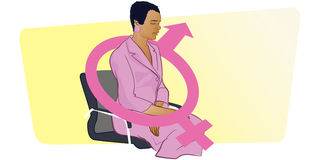Two genders? No, we should recognise the three in Kenya

Two genders? No, we should recognise the three in Kenya. Photo | Photosearch
What you need to know:
We need to realign the current policies to the three recognised gender identities in Kenya
Joyce is 40, single and childless. She is also a virgin. However, Joyce is not looking for a partner or a child. She has lived happily in her state until she realised that the system may never allow her to actualise a political ambition she has harboured since her youthful days.
“I am here because I need surgery to make me a woman,” she said when she came to the Sexology Clinic. “I need to have politically acceptable genitalia to fit in society to meet my ambition,” she shared.
Joyce was born with ambiguous genitalia. Her genitals do not fit in the vanilla definition of male -female divide. She belongs to the third gender, one that has been contentious over the years till very recently in Kenya. In the 2019 national census, Kenya became the first African country to recognise its intersex population. The move was intended to help end stigma and recognise the rights of intersex people who face challenges in accessing healthcare and education. According to the 2019 census, there are 1,524 intersex persons in the country.
“Yes, my gender was defined and recognised in the Kenyan law but this has not trickled down to all policies,” Joyce lamented.
In the last elections, she had wanted to vie for the Women’s Representative position in her county. She however feared the backlash. What if people learnt her true sex? Word would have spread like bushfire and she would have been stigmatised beyond what she could bear.
“If I can have my genitalia reconstructed to that of a woman then I could vie in the next elections with not much hullabaloo,” she said, “another alternative is to move quickly and change the law so that there is an intersex representative in parliament.”
Changing the law does take time however and one can never be sure how parliament would handle such a contentious issue. Joyce, therefore, stressed to me the need for her to bear the brut of her gender non-conformity to be able to advance her political ambitions.
While 1,524 Kenyans were registered as intersex, this may be an undercount since biologically it is known that 1 in 2000 individuals are intersex. It is therefore expected that Kenya should have about 25,000 intersex people.
According to the law, an intersex person is defined as one with a congenital condition in which the biological sex characteristics cannot be exclusively categorised in the common binary of female or male due to inherent and mixed anatomical, hormonal, gonadal or chromosomal patterns which could be apparent before, at birth, in childhood, puberty or adulthood. Simply put, these are people whose sex organs are not male or female.
“For the sake of giving me identity, my parents assigned me to be a girl at birth and registered me as such,” Joyce said staring into space.
“I have used that identity till now but whenever anyone sees me naked word spreads fast that I am not a woman,” she confides.
Joyce made me realise how flawed our gender rules are. The law, for example, requires that political appointments and public service recruitments ensure compliance with the one-third gender rule; that at least a third of appointments must be of the opposite gender. This policy assumes that gender is binary, which is flawed.
“That is why I need female genitalia, otherwise, I will never get a high-level job in my state,” Joyce says.
The danger with Joyce’s request, however, is that it perpetuates the denial of the existence of the third gender. It actually goes against the current legal framework. The decision by an intersex person to change their gender should not be based on the social pressure to conform and fit within the binary gender divide.
“At the same time, there is a lot of family pressure to marry and get children,” Joyce says, “my mother believes that I am a woman and should have gotten a boyfriend and had babies by now.” That was however not the least of Joyce’s worries. At one point she attempted to get into a relationship but the moment the man she was pursuing got to know her identity, he vanished into thin air. She made the decision to remain single.
Instead of forcing genital surgery down Joyce’s throat, we decided to put the word out there that there is an urgent need to realign the current laws to the three recognised gender identities in Kenya. Of urgency is to have the widely discussed one-third gender rule incorporate intersex.





